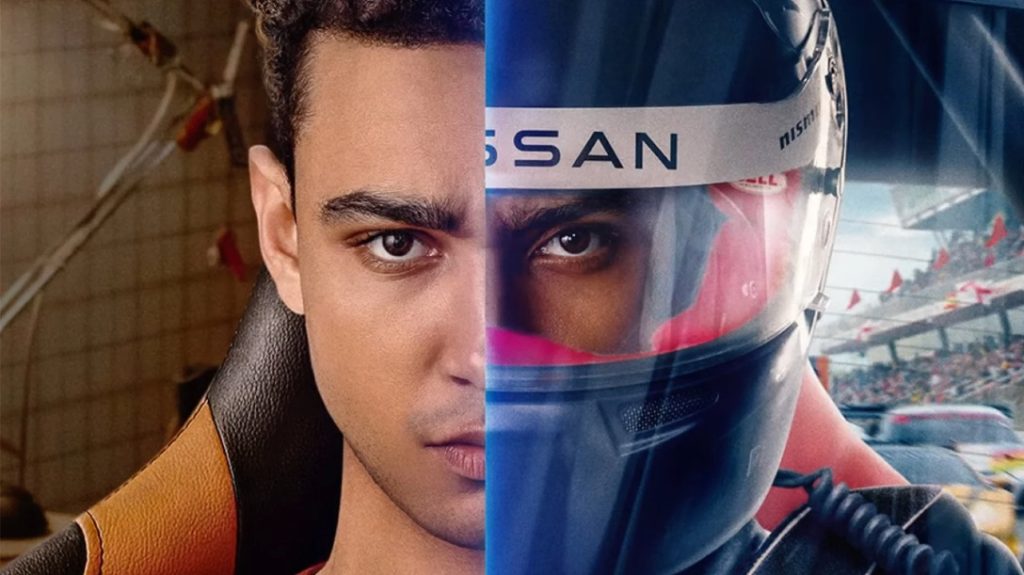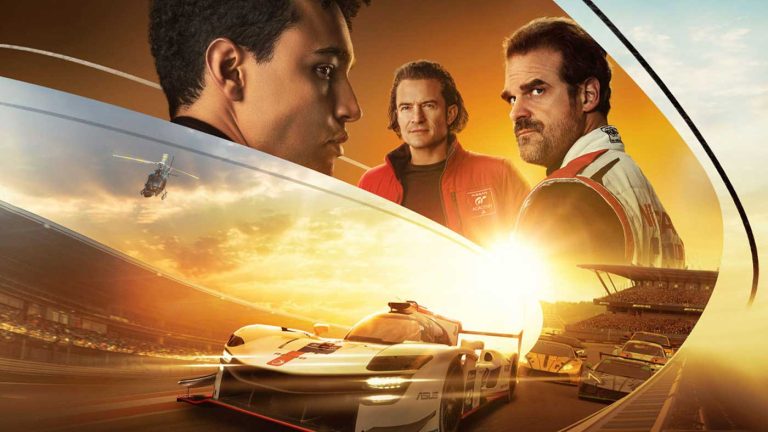“From gamer to racer” exclaims the poster of the…*checks notes*…Neill Blomkamp-directed, Orlando Bloom and David Harbour vehicle (lol) Gran Turismo.
A dramatisation of a true story about about a game that was so good it turned a gamer into a real driver, who was so good at fake driving that they could race for real, but the real people aren’t in the film, because this is a fake version of the real story. Also, a lot of the film is game-engine footage of the virtual game, and not real driving footage of actual tracks.
Read that again… If you’re sure you understand, you may continue.
In the same vein as Ready Player One, this follows the “based on actual events” story of how Jann Mardenborough went from very good video gamer, to pretty good actual driver. This has the effect of making the film feel like a feature-length advertisement for Gran Turismo. Which is funny, because the premise of the film is that marketing golem, sorry, “executive” Danny Moore (Orlando Bloom) convinces Nissan’s board that there’s 80 million sales opportunities lurking within players of this popular driving video game. Sorry, no. Don’t call it a game, it’s a “simulation”. This provides the marketing opportunity, *whoops*, funding for the project, which, in turn, draws in more gamers, which sells more games, which eventually leads to this movie, which is designed to… you get the idea.
Once we get past the premise and onto the driving, we find out just how tough it is to drive an actual real-life car. It’s a short, perfunctory montage of sequences that reminds us that race car driving is an athletic, physically difficult job and as such, athletes have to exercise. Most of the competitors in GT Academy are only there to service the main story, but strangely, star Archie Madekwe‘s Jann is replaced on the poster by (sort-of) antagonist Darren Barnet‘s Matty David (USA! USA!). Considering they’re relying heavily on the Gran Turismo brand, and the Bloom/Harbour star power, it’s a weird fake-out.
The real question is, “Is it exciting?” No, not really. Trying to bridge the gap between video gaming and race car driving was always going to be tough, but thankfully film-and-TV dad David Harbour is there to guide the young man into the “real” world. Out of everyone in the cast, Harbour shines, but he’s not covering any new ground here. The hackneyed trope of “magical Asian kung-fu master”, has been replaced by “magical Asian game programmer” as the film goes to great lengths to present Gran Turismo producer Kazunori Yamauchi as the auteur behind the gaming franchise.

The film feels 50% corporate video, and 50% teen melodrama. Additional backstory and requisite love-interest sub-plots aside, you can feel the sense of respect afforded to both gamers and “working stiff” racers. Another not-so-subtle Blomkamp dig at the rich gives Jann an easily-identifiable foe to beat on the racetrack, but when you’re talking wealth disparity in race car driving, it’s hard to empathise with the “plucky young kid from Cardiff” who’s flying private jets around the world to drive multi-million dollar cars real fast.
A few surprises are thrown in with the supporting cast, like Jann’s ex-footballer dad Steve (Djimon Hounsou) playing the “Dad-who-doesn’t-get-it” and… wait, is that Geri Halliwell spicing it up as the mum?! Yes, yes it is. Due to the nature of the game, the uncredited supporting role could be the game designers: they’ve made some of the most authentic digital recreations of real life cars and locations yet committed to the screen. In some cases you’ll have a hard time distinguishing between what’s real, and what’s CGI… and that’s the basic point of Gran Turismo. With AI developments moving so fast, and with this kind of accuracy, you might not know if you’re watching game engine footage or a real-world track.
Overall, Gran Turismo is only racing against itself: the “real” story of how a kid went from online to on-track. There’s no pathos here; no against-all-odds, rise-to-the-top scenario. It shows how a marketing opportunity paid off for a minute, and apparently it will give ammunition to kids everywhere when their their parents try to tell them that gaming screentime can never amount to anything in the real world.
The film is more interested in focusing on technical brilliance and simulated achievement rather than presenting us with an actually aspirational or emotional story. On paper it’s designed to encourage young people to pursue their dreams, on screen it feels more like Sony’s two-hour ad for GT online and Nissan motors.
5 simulated racer cars out of 10


